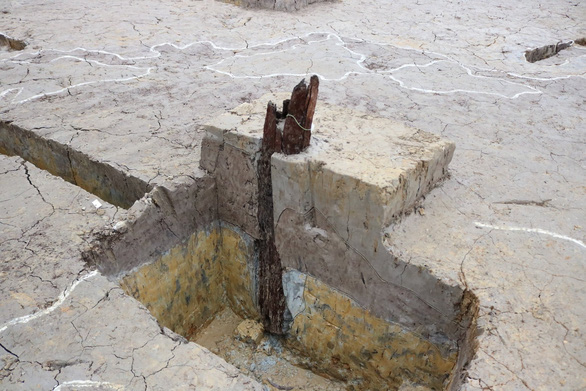Scientists believe that the discovery of the Cao Quy pile field in the northern coastal city of Hai Phong may be related to ancient Vietnam’s great Bach Dang Victory in the 13rd century.
Wooden artifacts reckoned to be left behind after the Battle of Bach Dang during the Tran Dynasty (1225-1400) era war against Mongol invaders in 1288 was recently discovered along the Bach Dang River in Hai Phong.
Local authorities, along with the Vietnam Institute of Archaeology and relevant agencies, started excavating the relics in a 950-square-meter area of Cao Quy Village, Lien Khe Commune, Thuy Nguyen District about two months ago.
Twenty-seven wooden stakes dating back to 1270-1430 were found being buried in a dried-up riverbed at the excavation site.
Based on archeological survey results combined with historical documents, scientists initially identified that the Cao Quy stake yard may be related to the great Bach Dang Victory in 1288, during which the Tran Dynasty’s army and people defeated Mongol invaders along the Bach Dang River.
According to ancient Vietnamese history, in the 10th and 13th centuries, on the Bach Dang River, three fierce naval battles against northern invaders occurred, with three respective resounding victories in 938, 981 and 1228 associated with the military genius of three national heroes Ngo Quyen, Le Hoan, and Tran Hung Dao.
The Vietnamese generals are believed to have made use of their knowledge of the local tidal cycle to have the stakes fixed on the riverbed, destroying unwary enemy boats that ventured near the riverbank in what is widely considered by historians as a tactical marvel.
Despite the findings, many experts caution that more information is needed before conclusions can be drawn from the wooden artifacts.
Le Van Sinh, a former lecturer in history methodology at the Faculty of History, Hanoi University of Social Sciences and Humanities, said it is still too early to confirm that the wooden piles are from the third Bach Dang battle in 1288.
“I hope these predictions coincide with historical facts. However, I understand that in order for our perception to approach objective truths, researchers must be very careful in assessing historic data,” Sinh said.
Sinh brought up an instance of Vietnamese experts being incorrect about a similar conclusion in the 1960s.
At that time, Vietnamese scientists sent samples of wooden piles discovered in the Bach Dang River to their peers in Germany and China for assessment.
However, results showed that the age of those wooden stakes did not match the recorded dates of historical events.
Like us on Facebook or follow us on Twitter to get the latest news about Vietnam!





















































